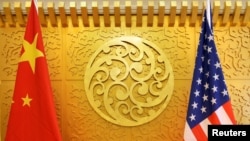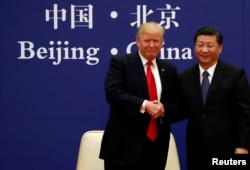Should Washington and Beijing reach an agreement on the current tariff impasse, that may not be enough to avert what many experts speaking at the Chey Institute for Advanced Studies called a “new Cold War” between the countries.
Yoon Young-kwan, former South Korean Minister of Public Affairs said, “We are now entering to a more unstable and dangerous era of international relations.”
He was not alone in that assessment.
“The foundations for a constructive U.S.-China relationship are more fragile than at any time in recent decades,” said Stapleton Roy, former U.S. Ambassador to China during the George H.W. Bush and Bill Clinton administrations and the founding director of the Kissinger Institute on China and the U.S.
He said the hostile rivalry between China and the United States will continue to adversely affect the interests of East Asian nations.
“If Washington and Beijing cannot reconcile their respective interests and ambitions in the western Pacific,” Roy added, “This will increase the possibility of military confrontations, divert resources from economic development to a dangerous and costly the arms race, and enhance the likelihood of nuclear proliferation and increased pressures on the countries in East Asia to choose sides.”
Former Assistant Secretary of State for East Asian and Pacific Affairs under the Obama and Trump administrations Daniel Russel also noted, “The deterioration of U.S.-China relations has implications for Northeast Asia that go well beyond North Korea. All countries are going to resist being forced to line up behind one side or another in a new Cold War.”
Furthermore, Executive Director at Nanjing University’s China Center for Collaborative Studies of the South China Sea, Zhu Feng, says Beijing is still “grappling” with the shift in Washington’s policy on China during the first two years of the Trump administration.
Zhu said China is “shocked” over the range and speed of how the bilateral relations have changed so quickly and that the current tariff dispute was a “wake-up call” for Beijing.
Ultimately Roy surmised, “No country will benefit from such an outcome [of a Cold War], least of all China and the United States.”
Repairing ties
The experts speaking at the Chey Institute for Advanced Studies inagural U.S.-China-South Korea trilateral conference were unsure how Beijing and Washington might resolve their current fractured relationship.
“I think the political atmosphere on China-U.S. relations in Washington is much worse than in Beijing,” said Jia Qingguo, a professor at Peking University.
He says that many are focusing more on the negative side of U.S.-China relations at the expense of ignoring the positive side of the of the relationship.
“We have a lot of shared interests between the two countries,” he adds, “The two sides have a lot of cooperation on global governance issues, immigration, corruption, anti-corruption, money laundering, [and] even cyber to some extent.”
He asserts that by taking into consideration the “shared interests and aspirations” of Beijing and Washington, a mutually beneficial relationship between the two can be created and managed.
Ajou University professor Kim Heungkyu also suggested that in order to balance, or mediate competition in the region, it may also become necessary for “middle powers” to play a greater role in the fostering of better ties between the U.S. and China.
Impact on Asia
Russel says that may be difficult because the geopolitical situation in the Asia Pacific region has been fundamentally altered.
“The whiplash that these countries in Asia feel from the reversal of U.S. policy from Obama to Trump from Trump to the next [president], has so undermined the confidence in sustained character and the dependability of U.S. policy, that countries in the Asia Pacific feel compelled to diversify [and] to reduce their dependence on the United States.
Another impact the tense relationship between China and the U.S has. on the region, says Jia, is Beijing’s role on denuclearizing North Korea.
He says that in China, some view the denuclearization of North Korea as a “U.S. problem” and Beijing should not be involved. Others, Jia says, view it as a “Chinese problem,” and it should work with Washington to bring about a solution.
However, because of increased U.S.-China tension, “These people will say, ‘You know, now China-U.S. [relations] is so bad, why should we help the U.S.?’”
He further states that if the United States and China were to become “enemies,” then some feel it would be in Beijing’s best interest not to apply pressure to North Korea, thus creating more problems for Washington.
How the United States and China resolve their current issues will have an impact on Beijing’s foreign policy, said Jia.
U.S. President Donald Trump is scheduled to meet North Korean leader Kim Jong Un in Hanoi, Vietnam February 27-28 for a second denuclearization summit.
In addition, on Sunday, the president touted "big progress" was being made in trade talks with China.






